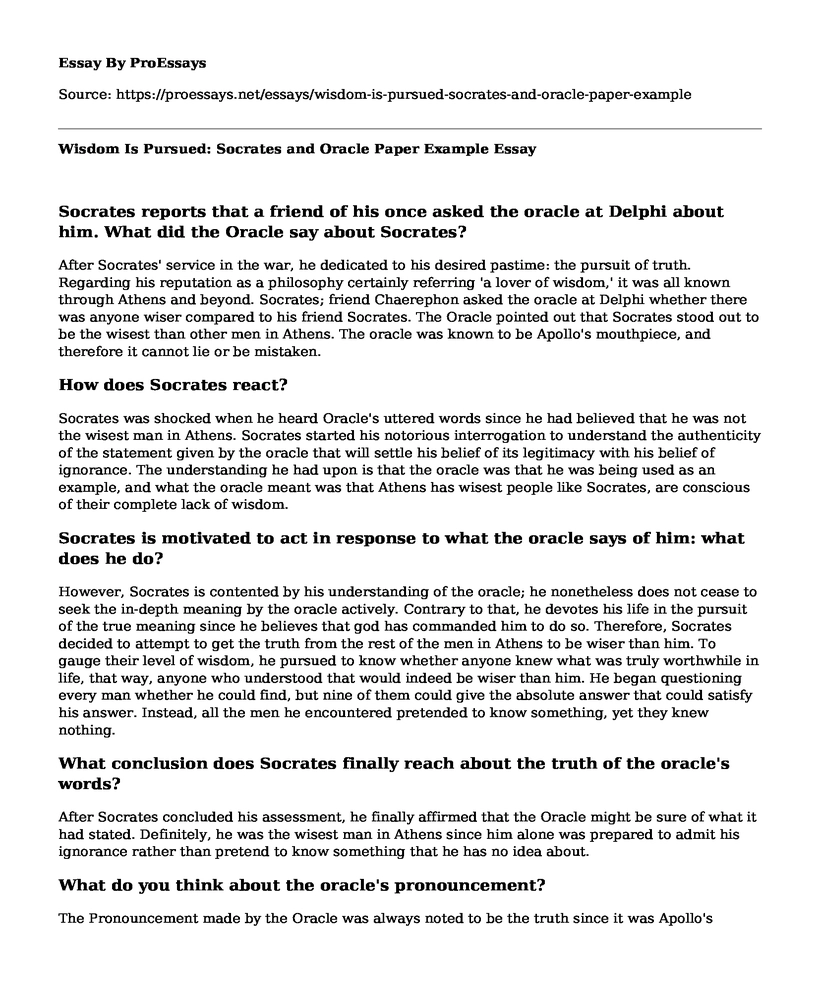Socrates reports that a friend of his once asked the oracle at Delphi about him. What did the Oracle say about Socrates?
After Socrates' service in the war, he dedicated to his desired pastime: the pursuit of truth. Regarding his reputation as a philosophy certainly referring 'a lover of wisdom,' it was all known through Athens and beyond. Socrates; friend Chaerephon asked the oracle at Delphi whether there was anyone wiser compared to his friend Socrates. The Oracle pointed out that Socrates stood out to be the wisest than other men in Athens. The oracle was known to be Apollo's mouthpiece, and therefore it cannot lie or be mistaken.
How does Socrates react?
Socrates was shocked when he heard Oracle's uttered words since he had believed that he was not the wisest man in Athens. Socrates started his notorious interrogation to understand the authenticity of the statement given by the oracle that will settle his belief of its legitimacy with his belief of ignorance. The understanding he had upon is that the oracle was that he was being used as an example, and what the oracle meant was that Athens has wisest people like Socrates, are conscious of their complete lack of wisdom.
Socrates is motivated to act in response to what the oracle says of him: what does he do?
However, Socrates is contented by his understanding of the oracle; he nonetheless does not cease to seek the in-depth meaning by the oracle actively. Contrary to that, he devotes his life in the pursuit of the true meaning since he believes that god has commanded him to do so. Therefore, Socrates decided to attempt to get the truth from the rest of the men in Athens to be wiser than him. To gauge their level of wisdom, he pursued to know whether anyone knew what was truly worthwhile in life, that way, anyone who understood that would indeed be wiser than him. He began questioning every man whether he could find, but nine of them could give the absolute answer that could satisfy his answer. Instead, all the men he encountered pretended to know something, yet they knew nothing.
What conclusion does Socrates finally reach about the truth of the oracle's words?
After Socrates concluded his assessment, he finally affirmed that the Oracle might be sure of what it had stated. Definitely, he was the wisest man in Athens since him alone was prepared to admit his ignorance rather than pretend to know something that he has no idea about.
What do you think about the oracle's pronouncement?
The Pronouncement made by the Oracle was always noted to be the truth since it was Apollo's mouthpiece. The pronouncement made by the oracle was intended to show the society that there are people who pretend that they know much yet they know nothing and the ones who admit that they know a little, but they treasure knowledge and seek it, they are indeed the wise people in the society. There is no one particular person can ever claim that they know and understand everything at any given point. Socrates doubt when told that he was wise together with the action he took to confirm pronouncement, it is what Oracle refers it as wisdom.
Is it true or helpful in a larger sense?
Socrates wisdom as stated by the Oracle might be considered true on a large scale. When applying the argument in terms of the modern logic, then we will agree that what he did was a reductio ad absurdum against the assumption that they are wise, hence forcing him to position the rest of the men as fools and him as the wise so far as he did not make the foolish claim to know things. Socrates action positions him as wise beginning from the point that he knew nothing and therefore he was pursuing knowledge as something of worth he does not "own" already- rather than treating knowledge as possessions. He perceived knowledge as something that is acquired through active inquiry; hence he understands that knowledge as a treasure, rather than cheapening it through treating it likes some status object that is how doctrinaires perceived knowledge. In that view, Socrates is seen as wise, as he knew that knowledge is perused at a heavy personal cost, and not purchased as a property. Besides, he could be referred to as wife considering his approach to the question of knowledge, as well as his appreciation of his ignorance at the start of the inquiry. He appreciated his own "irrelevance" before the object of knowledge. He exercised humility as he inquired which others could mistakenly view it as arrogance or being a nuisance. Still in the current society, there are those people who are ignorant of knowledge, never pursuing it but they still claim that they are wise and they can advise and decide on serious matters.
Cite this page
Wisdom Is Pursued: Socrates and Oracle Paper Example. (2022, Aug 18). Retrieved from https://proessays.net/essays/wisdom-is-pursued-socrates-and-oracle-paper-example
If you are the original author of this essay and no longer wish to have it published on the ProEssays website, please click below to request its removal:
- Ideas of Appearance and Illusion in Othello Play Essay
- Defending Walls' Arguments on Ethics and Morality
- The Painted Bird by Jerzy Kosinski - Literary Analysis Essay
- Harris V Craig on Morality and God: Response Essay
- Essay Example on Prospero's Daughter: Miranda in Shakespeare's 'The Tempest'
- The Principle of Identity: Existence & Change - Essay Sample
- Paper Example on Exercising Free Will: Understanding Choices & Consequences







